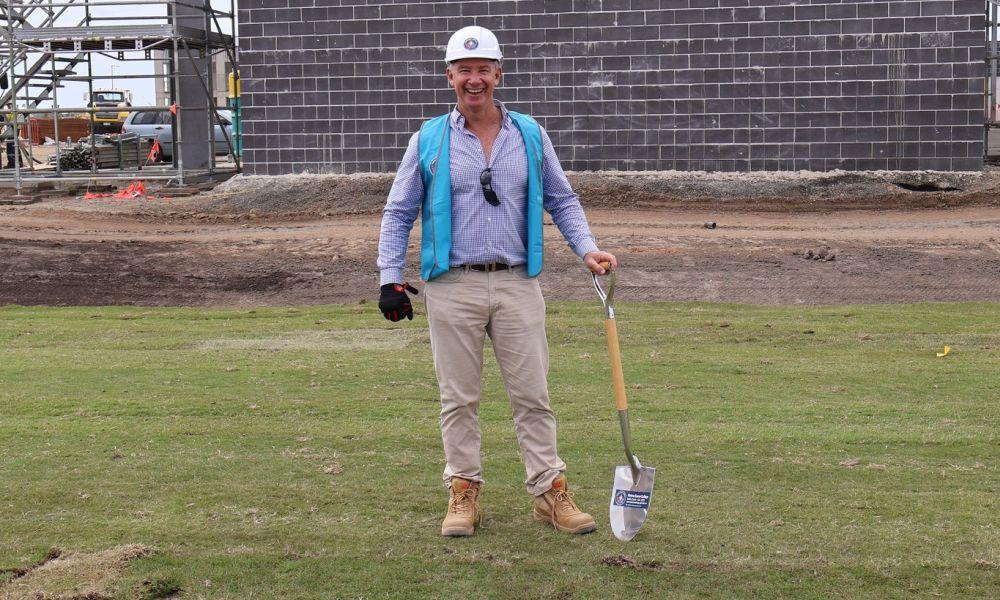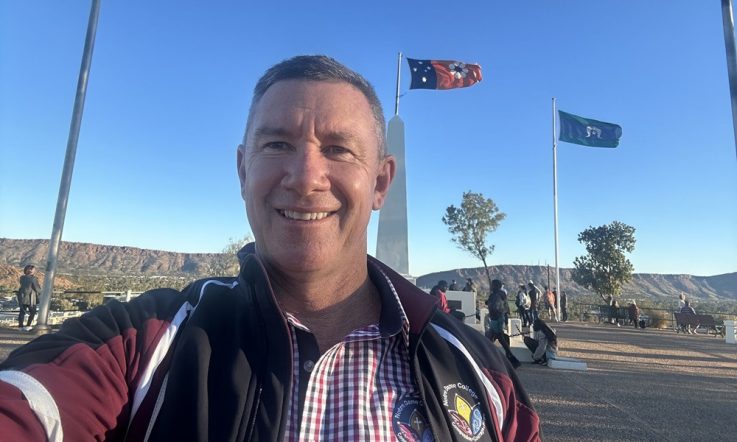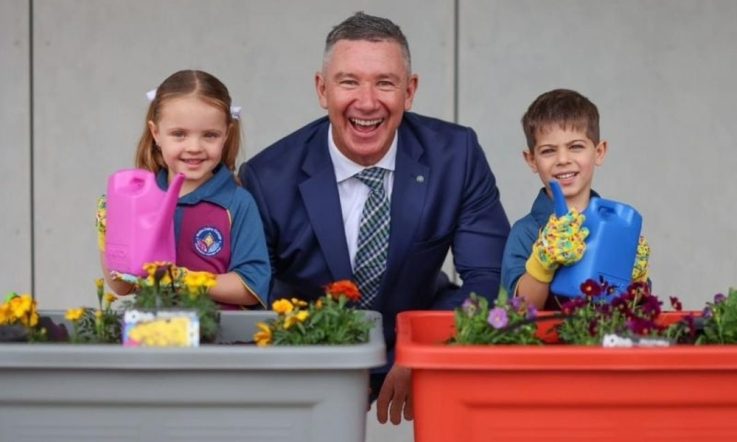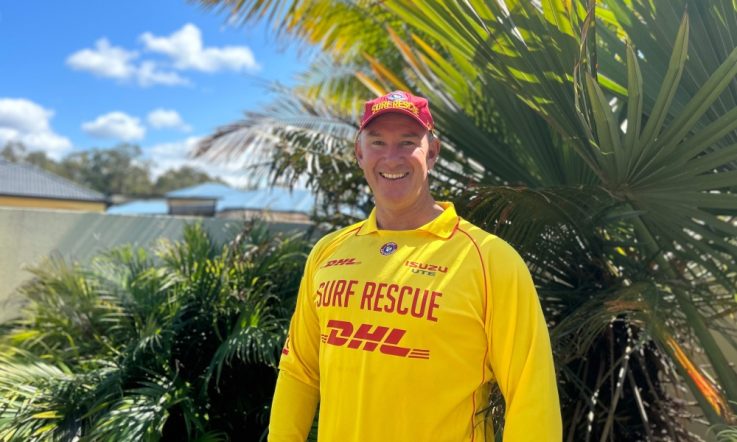This podcast from Teacher is supported by Monash University. Join the conversation with leading academics in teacher education. The final episode of their podcast ‘Let’s Talk Teaching’ Season 2 is available on 29 November.
Hello and welcome to the Teacher podcast, I’m Jo Earp. We’re back with another episode of School Assembly – that’s the podcast where we talk to foundation principals about what it’s like to lead a brand-new school. We’ve been following Dan McShea, Principal of Notre Dame College in Queensland. And this series, Series 3, started back in August, but Dan has been in the role for the entirety of 2024. The P-12 college is opening at the beginning of 2025, so things are really starting to come together now. In Episode 4 we’re talking leadership. We’ll hear from Dan about the kind of leadership he believes in, and some of those differences between taking on the role at an existing school, as opposed to being a foundation principal. We’ll also chat about how his leadership has evolved over the years, including the impact of the pandemic. It’s another great episode – I hope you enjoy it too!
Jo Earp: Hi, Dan. It's good to talk to you again. How are things going where you are?
Daniel McShea: Oh, hi, Jo. Yeah, things are going great, we're building a new school here – this is really happening, and things are getting pretty close with a few finishing touches. We've been doing lots of shopping, we've had our teaching staff together for 2 days, we've got grass on our school oval, and we're nearly ready to go.
JE: It’s all taking shape, isn't it? It'll be exciting to talk about. Next time out I think we're talking about the buildings, so we'll have a chat [about that] then. And last time out we talked about the school vision and the mission statement and how that links into your strategic planning there. For this episode, then, I want to focus on leadership. I'm interested, when you first started in teaching, if you can sort of cast your mind back, did you always aspire to be a principal or was that something that kind of happened as you progressed through your career?
DM: Yeah, when I started teaching, I had no aspirations whatsoever of becoming a principal or even considered that as a possibility. It honestly never crossed my mind until I was actually asked to become one. I hadn't gone straight into teaching from school; I'd worked in the finance industry, I'd been in the Army Reserve, I’d been managing a hotel, and I'd spent a few years working out what I wanted to do.
And look, I love being a teacher, I love engaging with young people and I was very happy in the classroom. But I did say ‘yes’ to various opportunities and challenges as they came up, and these probably led to others. I was asked to be a Sports Master at my school (which I was even reluctant about), and then a Head of Department, and then I took on a couple of Acting Assistant Principal roles at my own school at the time, and at other schools in our area, which led to opportunities to become a Deputy Principal and then a Principal in North Queensland, and then in Charters Towers before we came back to the Sunshine Coast – which was always our dream to live that coastal lifestyle style that our family enjoys. And now I've got the opportunity to be a Foundation Principal at Notre Dame, and I'm still sort of pinching myself about that opportunity.
JE: Hmm, yeah, it's something that sometimes you don’t set out with that intention, do you? Do you think it was, you know, you were saying it sort of developed over the years, do you think that was sort of you weren’t quite aware of what the role was, or you were just, like, focused on the teaching aspect of it?
DM: Yeah, I couldn't say. I did have one particularly great principal who really believed in me and encouraged me, and despite [me] being a little bit reluctant sometimes he was really helpful. And yeah, I guess you know that desire for an adventure as well and to take on a challenge and a willingness to perhaps go to places that other people wouldn't have wanted to go to, as well, leant itself to that journey, I guess.
JE: Yeah, often mentors play a really important role, don’t they, in our careers. How would you describe your leadership style then? And I'm also interested how has that changed over the years, if in fact it has.
DM: Yeah. Look, I think, you know, you'd obviously get a more accurate picture by maybe asking some of the people that have been led by me. But I could share the kind of leader that I hope to be and what I believe about leadership, and I think it does change, and it has changed over time.
I really believe that good leadership is about being true to your values and being present to the people that you lead, however, certainly context and the challenges in front of you shape how you lead and what you prioritise and where you turn your attention. I think throughout my leadership journey, I've embraced my authentic self more and become less concerned with perceptions and more focused on what truly matters – our young people, their futures, our staff. And so, I'd probably describe my leadership style as relational, collaborative, I hope supportive. I want to empower my team and create an environment where people feel valued and heard.
And I love my job. I think it's important that we love the work that we do, and I want others to love theirs as well. And I hope that over the years my style has become more adaptive, more responsive to the needs of my community. Probably flexibility and openness while maintaining a clear vision and direction is important.
And, you know, in the context of a new school setting I'm trying to build a positive family-like culture that encourages innovation and meets the changing needs of education for our young people. So, certainly there's a change and a maturation of a leader, I guess.
JE: Yeah. Which is what you'd expect, I guess. Am I right in thinking you were a principal during the COVID lockdowns?
DM: Yeah, correct, I was a principal during the COVID lockdowns.
JE: How did that sort of impact your leadership approach? Because I've spoken to a couple of principals about that period and they were saying, you know … it was a period where you didn't have time to do that broad consultation. It was more about, you know ‘I'm the principal, I'm the leader, I'm going to give you some information’ and there you go. And that's not really the style they would normally adopt. So, I'm just interested in what impact it had in terms of your approach.
DM: Yeah, I'd have to frame this by saying that Queensland was quite insulated from some of the extreme lockdowns and extended closures that we saw across the rest of the country. However, the COVID experience certainly had a big impact on my leadership approach and the pandemic experience definitely required us to adapt quickly. Often, we were getting new direction or new rules on the day of, and we had to be really versatile and pivot regularly. We had to constantly find new and innovative ways to support our students and our staff, and particularly focus on the wellbeing of our people. And I really hope that as we've moved on from that time that we still attend to people's wellbeing better than we did before it.
It was an incredible learning experience for us. We did some things that I think we could be really proud of during that time. We transitioned to online learning really well and quickly, and our staff, you know, really received so much professional learning during that time that if you weren't in a school and you jumped back in afterwards, I think it would be hard to re-enter into that space.
At our school we actually did a drive-through meal service for our families. We redeployed out our tuck shop convener and a chef who'd become out of work during that time (who was a husband of a staff member) and they produced over 1,000 meals to families who were doing it tough during that time. And that was wonderful; and it was wonderful for our students to be involved in that as well.
And, you know, look, I'll take my hat off to those who led schools during that pandemic experience in places that were much more hard off than we were up here in Queensland.
You’re listening to a podcast from Teacher magazine, supported by Monash University's Faculty of Education. Listen to their podcast ‘Let’s Talk Teaching’, hosted by former teacher, Associate Professor Rebecca Cooper, as she invites teachers and alumni with a range of educational backgrounds and experiences to share their insights and discuss practical topics to help you develop and grow as a teacher. The final episode of Season 2 is available on 29 November.
JE: You sort of touched on mentors there, some people that have sort of guided you along the way. What have you learned about leadership from your own mentors over the years? I'm interested is there something, in terms of advice, that you come back to regularly, or you can hear their voice in your head?
DM: Yeah, I always find this question a little bit challenging. I've certainly been fortunate to have incredible mentors throughout my career, and that's spanned different industries; also, coaches that I've had for sports that I've played, others – family members and friends, and that I've crossed paths with – rather than having a single key mentor. And I've also, interestingly, learned a great deal from the non-example – from the mistakes and the shortcomings of others; and I think sometimes those messages can be just as enlightening.
I had one principal, certainly, who really believed in me and encouraged me, and I would say that he really contributed to my growth. A simple, yet profound, piece of advice that's really sat with me and something that I use myself often with staff and students, is that need to leave things better than you found them. And I often challenge our students and our staff to leave their school, their community, their relationships better than they found them, and that their school should be better because they were there, just as it should better because I was there, and we both should be better for that. So, leaving things better. And look as I said earlier, we're focused on building a culture that feels like a family, a strong sense of belonging. And I try to make a point of knowing people's names, of rolling up my sleeves and working hard and showing genuine care for people.
JE: Of course this particular podcast series, School Assembly then, it's about building a school from scratch, and in Episode 1 you mentioned you've worked in a new school twice before (and you've spoken about some of that leadership experience today) but not as a principal. But you were Principal of Unity College prior to taking on this particular role. How do you think the leadership aspects of being a principal compare between the new school and an existing one? You've mentioned there about, you know, building that family culture. Is there a massive difference between the 2, or is it essentially sort of the same job?
DM: It really is different, Jo, I think. This is the 4th school that I've had the privilege of leading, and each one has been vastly different to the next. However, leading a brand-new school and having this entire year to establish that has been a completely different experience. Again, I would say that leading an existing school really requires understanding and respecting, even sometimes tiptoeing around, the established cultures, and trying to find innovative ways to improve and shape with what's already there. I think you need to pick your battles a lot more and be conscious of balancing the preservation of what's already there with the new ideas that you may have. And so that requires an ability to navigate that dynamic.
Whereas in a new school, you have the freedom to be to be bold, to create the mission, to shape the culture, establish traditions and really create a vision from the ground up without the constraints of those inherited practices, people, or the baggage that they carry. And that journey's been really, really exciting and it's been highly collaborative. It’s involved a lot of dreaming and ideas and planning, and we've also had the opportunity to recruit staff whose values align with the culture that we're trying to establish.
So, that's a once-in-a-lifetime opportunity, really, when you think about it. So that's been one that we've been conscious of the importance of getting it right and probably just about the best part.
JE: I love the fact that you're saying ‘we’ all the time as well you see, that’s a true leader, you’re taking everybody along with you. It's not an ‘I’ job, is it, it’s a ‘we’ job with the team.
DM: No, it's not an ‘I’ job, it's definitely not an ‘I’ job; and there's 8 people on our team here right now that are already busily focused on getting Notre Dame College up and ready. And we have gathered with all of our teaching staff already in the last week to prepare for 2025 as well. So, it's definitely ‘we’ not ‘I’.
JE: Yeah, that kind of distributed leadership model as well. OK then, we're going to wrap up this episode with the usual 3 questions. Proudest achievement first of all.
DM: Oh, proudest achievement – last week, we brought all of our teaching staff together for 2 days of formation and we were in a beautiful place with great people, and to see that team connect, engage, dream, wonder, interact with each other was, you know, more than exciting. And the possibilities and potential of them working together really is incredible. So, that was proudest achievement probably so far in the whole year actually.
Our biggest hurdle. Look, well we're quite close to having our buildings finished. You know, things keep shifting and we keep having to adjust our plans for how we're going to move in there, and some things won't be quite ready at the end of December, which we'd hoped for. So, it's just that constant reconsidering and readjusting our intentions for how we move over there for next year.
Biggest learning. Biggest learning is ‘make every day count and try to be fully present to what you're doing and getting it done’. There's a lot of noise and a lot of distractions, particularly now. We're in quite a small space, there’s 8 people in here, you easily, constantly feel like, yourself, you’re in 4 different meetings at a time. And there's a sweet spot between being collaborative and getting things done. So, I think we need to divide and conquer and check back in. That's been our learning – make it count.
JE: Very good – make it count! Well, yeah, we're ramping it up aren’t we. We’re in November already, next time we catch up we'll be talking about those last bits and pieces to do with the building, but also some of the thought that's gone into that. So, yeah, looking forward to that one. But I will leave you to it today, and have a good rest of the month and I'll catch up with you soon.
DM: Thanks, Jo, always good to speak with you. You have a great day.
That’s all for this episode – but if you want to keep listening, there are hundreds more podcasts in the Teacher archive, including Episodes 1-3 from this series of School Assembly, and the full Series 1 and 2. Visit teachermagazine.com, or wherever you get your podcasts from, to access those. And please do take a moment to leave a rating and review – it helps more people you like to find the podcast, and it’s a big support for the Teacher team. Bye.
You’ve been listening to a podcast from Teacher, supported by Monash University. Listen to their ‘Let’s Talk Teaching’ podcast for valuable strategies and insights on the challenges teachers face today.
Other episodes in this series:
In this episode Dan McShea discusses what he believes leadership to be about, and the kind of leader he hopes to be. How would you describe your own leadership philosophy to others? How does this play out in your own work, day-to-day?
Dan also talks about a mentor who encouraged him. Think about a piece of advice you’ve received in your own career that you still reflect on. How has it shaped your approach?



